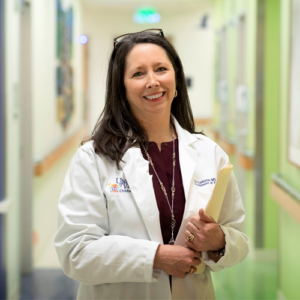
Ann Kellams, MD
A sweeping campaign to identify ways to encourage breastfeeding has concluded that existing efforts place too much emphasis on individual breastfeeding duration and not enough on the many outside factors that determine breastfeeding success.
Doctors consider breastfeeding ideal for the health of infants and mothers alike, but, for some moms, breastfeeding can be difficult or impossible. To find ways to support parents through the breastfeeding process, the Academy of Breastfeeding Medicine (ABM) and Reaching our Sisters Everywhere (ROSE) brought together families, community members, healthcare workers and researchers to explore the challenges associated with breastfeeding and identify ways to overcome them.
The results, published in the scientific journal Breastfeeding Medicine, provide important insights into the difficulties many parents face. Participants described how they often felt social pressure to give their babies formula rather than breast milk, even though all major medical groups recommend exclusive breastfeeding for the first six months. Many participants talked about how they felt poorly prepared for the difficulties they would face when breastfeeding. Some described impersonal care from healthcare workers and lack of support from family members.
The findings will guide future breastfeeding initiatives and reveal where additional study is most needed, said researcher Ann Kellams, MD, a breastfeeding expert at UVA Health Children’s.
“It doesn’t help anyone to say you should breastfeed and then not have the support and evidence-based best care that we know helps families reach their infant feeding goal,” said Kellams, a pediatrician and breastfeeding and lactation medicine specialist. “In this study, we asked the breastfeeding person themselves what is important to them, what they need in order to be successful.”
Breastfeeding Challenges
The ABM partnered with ROSE specifically to engage with non-Hispanic Black women, a group that has the lowest rates of breastfeeding in the United States. ROSE conducted virtual town halls in Virginia, Maryland and Washington, D.C. The researchers also performed outreach to other groups, including conducting an online survey shared widely through social media and electronic mailing lists for parents and lactation-support providers.
The effort sought to foster dialogue about the challenges of breastfeeding by asking open-ended questions such as “What question(s) do you have about help getting started with breastfeeding?” and “What questions do you have about how to treat medical problems that can come up during breastfeeding?”
The responses spoke to how lonely and overwhelmed parents can feel when it comes to breastfeeding. Many wanted to “transform the lived experience for families,” the researchers report. Participants recommended fostering opportunities for family members to “experience being a village,” such as community events, and called for more holistic approaches to healthcare, such as increased integration of community health workers and doulas. Participants also wanted more access to telehealth, more flexible healthcare scheduling and more guidance on when and how to seek help with breastfeeding.
In the short term, Kellams says, the feedback will be invaluable for healthcare workers seeking to encourage breastfeeding. But it also offers a critical roadmap for future breastfeeding initiatives and research, so that such efforts reflect parents’ wants and needs. For example, the results suggest that there is significant demand for more study of the effectiveness of different approaches to managing common breastfeeding problems such as pain and limited milk supply.
“We hope to take what we have learned from families and translate that into effective interventions,” Kellams said. “Breastfeeding is a ‘team sport,’ and whether you are a healthcare professional, family member, friend or community member, we are all on the team. In order for us to have healthier lives on a large scale, we all need to do our part to support breastfeeding success.”
About the Research
The breastfeeding paper was authored by Kellams, Laura Kair, Kimberley Broomfield-Massey, Kimberly D. Harper, Kimarie Bugg and Alison Stuebe. They have no financial interest in the work.
The study was supported by a Patient-Centered Outcomes Research Institute Eugene Washington PCORI Engagement Award, EASCS-22866. In addition, Kair was supported by a Building Interdisciplinary Research Careers in Women’s Health award, K12 HD051958, funded by the National Institutes of Health’s National Institute of Child Health and Human Development, Office of Research on Women’s Health, Office of Dietary Supplements and National Institute of Aging.
To keep up with the latest medical research news from UVA, subscribe to the Making of Medicine blog at http://makingofmedicine.virginia.edu.
Filed Under: Research
